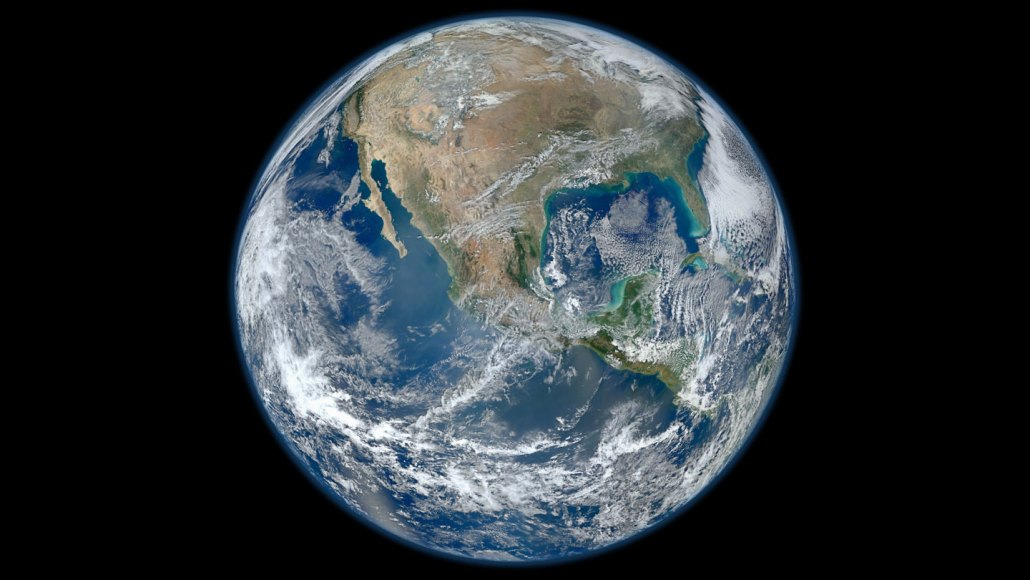A passing star could fling Earth out of orbit — or into the sun
The chance of this happening is very small, but not impossible, computer models suggest

The gravity of passing stars can jostle our solar system. That might someday cause another planet to smash into Earth (shown here in a satellite image) — or eject our planet from the solar system altogether.
NASA
Share this:
- Share via email (Opens in new window) Email
- Click to share on Facebook (Opens in new window) Facebook
- Click to share on X (Opens in new window) X
- Click to share on Pinterest (Opens in new window) Pinterest
- Click to share on Reddit (Opens in new window) Reddit
- Share to Google Classroom (Opens in new window) Google Classroom
- Click to print (Opens in new window) Print
By Ken Croswell
Bad news, earthlings. Computer models of the solar system’s future reveal a new risk facing us all. The gravitational tug of a passing star could cause another planet to smack into Earth. Or it might fling our planet into the sun. Or it could send Earth far away from the sun, where any inhabitants would freeze.
“None of these things are probable,” says Nathan Kaib with a laugh. This astronomer works at the Planetary Science Institute, based in Iowa. He teamed up for this research with astronomer Sean Raymond, at the University of Bordeaux in France.
Over the next 5 billion years, they calculate, Earth’s chance of an apocalypse caused by a passing star is only 0.2 percent. That figure is based on the number of stars passing near our solar system. That’s pretty slim odds of a drive-by star destroying or ejecting Earth within the lifespan of our sun.
Still, it’s a much greater risk than past studies had found. Those estimates hadn’t accounted for the long-term influence of passing stars.
Kaib and Raymond posted their findings to arXiv.org on May 7. Later this year, the journal Icarus will publish them, too.
Do you have a science question? We can help!
Submit your question here, and we might answer it an upcoming issue of Science News Explores
The role of our planetary neighbors
If another star gets too close to us, Mercury will be key to the risk of Earth’s demise.
The innermost planet’s orbit around the sun is fairly oval-shaped. And astronomers have long known that Jupiter’s gravity can stretch its orbit out even more. The new models show that passing stars heighten this danger.
In those models, Mercury’s orbit becomes so elongated that the planet typically collides with the sun or Venus. The resulting chaos sometimes causes Venus or Mars to crash into Earth. Other times, Earth crashes into the sun. Or Venus and Mars can fling our world toward Jupiter. The giant planet’s gravity then ejects Earth from the solar system.
“It’s a little scary how vulnerable we may be to planetary chaos,” says Renu Malhotra. A planetary scientist, she works at the University of Arizona in Tucson.

Malhotra thinks past encounters with other stars have already influenced the solar system. For instance, one would expect the giant planets to have nearly circular paths around the sun. That’s because the planets formed from a disk of gas and dust with a nearly circular orbit. But today, three of the giant planets — Jupiter, Saturn and Uranus — have somewhat oval-shaped orbits. The gravity of passing stars may have tugged them onto these paths.
The most dangerous stars, Kaib says, are those that come closest — less than 100 times as far from the sun as Earth is. Stars that move slowly are also risky. Especially ones that move less than 10 kilometers (6 miles) per second relative to the sun. That cosmic snail’s pace extends how long their gravity will be able to tug on the planets.
However bad things look for Earth, though, be glad you don’t live on distant Pluto.
Without passing stars, Pluto was thought to have an even more stable orbit than Earth. “But once you allow stars to alter the solar system and push things around,” Kaib says, Pluto is in trouble. It can skirt by the giant planets. Then their gravity can kick it out of the solar system. Or Pluto can smash into one of them.
Over the next 5 billion years, the chance of such a fate befalling Pluto is about 4 percent. That’s 20 times greater than the risk facing Earth.
There is one upside to Pluto getting booted from the solar system, though. It might just end the long-standing debate over whether Pluto is really a planet.






